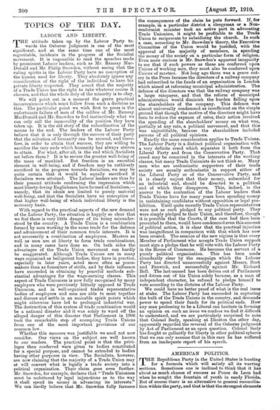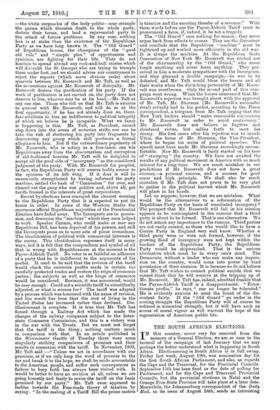AMERICAN POLITICS.
rilHE Republican Party in the United States is hunting .1. for a formula which will satisfy all its warring sections. Sometimes one is inclined to think that it has about as much chance of success as Ponce de Leon had when he sought the fountain of youth in sandy Florida. But of course there is an alternative to general reconcilia- tion within the party, and that is that the strongest elements —the white corpuscles of the body politic—may strangle the germs which threaten death to the whole party, dictate their terms, and lead a rejuvenated party to the attack of future problems. In any case, nothing less is at stake than the existence of the Republican Party as we have long known it. The "Old Guard" of Republican bosses, the champions of the "good old rule" and "simple plan" of opportunism and cynicism, are fighting for their life. They do not hesitate to spread abroad any cock-and-bull stories which will discredit the St. Georges who are trying to trample them under foot, and we should advise our countrymen to reject the reports (which serve obvious ends) about quarrels between Mr. Roosevelt and Mr. Taft, as well as the accusations against Mr. Roosevelt of disloyalty. Mr. Roosevelt desires the purification of his party. If the work of purification is not carried on, the party does not deserve to live, whoever may be at its head,—Mr. Taft or any one else. Those who tell us that Mr. Taft is anxious to quarrel with Mr. Roosevelt, and will do so at the first opportunity, if he has not already done so, there- fore attribute to him an indifference to political integrity of which we believe he is incapable. What we fancy is happening is this. Mr. Taft, as President, cannot step down into the arena of sectarian strife, nor can he take the risk of shattering his party into fragments by denouncing any group which still professes a formal allegiance to him. But if the extraordinary popularity of Mr. Roosevelt, who is acting as a free-lance, can win Republicans away from the obscurantism and corruption of old-fashioned bossism Mr. Taft will be delighted to accept all the good side of " insurgency " as the considered judgment of the party. With Mr. Roosevelt for prophet, in fact, the Republican Party will swerve bodily nearer to the opinions of its left wing. If it does it will be enormously strengthened by having reformed the party machine, settled the hash of " Cannonism " for ever, and cleared out the gang who run politics and, above all, get tariffs framed in the interests of great corporations.
• Recent by-elections have conveyed the clearest warning to the Republican Party that it is expected to put its house in order. In some of the Western States the enormous official Republican majorities of the Presidential Election have faded away. The Insurgents are in posses- sion, and denounce the" machine" which they once helped to work. Speaker Cannon, who could make or mar any Republican Bill, has been deprived of his powers, and still the Insurgents press on to more acts of pious iconoclasm. The identification of political with commercial interests is the enemy. This identification expresses itself in many ways, but it is felt that the compendium and symbol of all that is wrong with Republicanism at the moment is the Payne-Aldrich Tariff. No voter is so faithful an adherent of a party that he is indifferent to the arguments of his pocket. It used to be said that the revision of the tariff would cheek the excessive profits made in certain too carefully protected trades and restore the reign of economic justice ; the subjects as well as the kings of commerce would be considered. Revision, it was announced, would be easy enough. Could not a scientific tariff be scientifically adjusted, or what is science for? The tariff was adapted by a process which was honoured with the name of revision, and the result has been that the cost of living in the United States has increased rather than declined. Dis- illusionment is complete. It is true that Mr. Taft has forced through a Railway Act which has made the charges of the railway companies subject to the Inter- state Commerce Commission, and this is a victory won in the war with the Trusts. But we must not forget that the tariff is the thing— nothing matters much in comparison with that. In an article published in the Westminster Gazette of Tuesday there were some singularly striking comparisons of promises and their results in connexion with the tariff. In November, 1908, Mr. Taft said :—" -Unless we act in accordance with our promises, or if we only keep the word of promise to the ear and break it to the hope, we shall be made accountable to the American people, and suffer such consequences as failure to keep faith has always been visited with. It would be better to have no revision at all, unless we are going honestly and fairly to revise the tariff on the basis promised by our party." Mr. Taft even appeared to incline towards the Free-trade theory of taxation by saying : "In the making of a Tariff Bill the prime motive is taxation and the securing thereby of a revenue." With those words before one the Payne-Aldrich Tariff must be pronounced a farce, if, indeed, it be not a tragedy.
The "Old Guard" care nothing for reason ; they never argue back from effects to causes. They see the discontent and conclude that the Republican " machine " must be tightened up and worked more efficiently in the old way. It is always the machine. At the Republican State Convention of New York Mr. Roosevelt was tricked out of the chairmanship by the "Old Guard," who never forget anything and never learn anything. They per- ceived in him a moderate sympathiser with the Insurgents, and they planned a double campaign,—he was to be defeated, and Mr. Taft would bless the bosses and all their works when the disturbing personality of Mr. Roose- velt was overthrown. Only the second part of this cam- paign went wrong. When the bosses announced that Mr. Roosevelt's rejection was brought about with the approval of Mr. Taft, Mr. Sherman (Mr. Roosevelt's successful rival) actually had in his pocket, according to the Times correspondent, a telegram from Mr. Taft urging that the New York leaders should "make reasonable concessions to Mr. Roosevelt in order to avoid controversy." Mr. Roosevelt does not believe in fugitive and cloistered virtue, but sallies forth to meet his enemy. His first move after his rejection was to invade Utica, the home of Mr. Sherman, the Vice-President, where he began his series of political speeches. The speech must have made Mr. Sherman exceedingly uncom- fortable. Now Mr. Roosevelt is fairly started on his tour of " stumping " the country. We have not awaited the results of any political movement in America with so much interest for a long time. We are much mistaken in our predictions if Mr. Roosevelt does not have a great success,—s, personal success, and a success for good sense and high principle. We shall also be much mistaken if Mr. Taft does not prove to be very glad to gather in the political harvest which Mr. Roosevelt will place in his hands.
Let us suppose, however, that we are mistaken. What would be the alternatives to a reformation of the Republican Party on the basis of conciliated insurgency ? The prospect that Mr. Roosevelt will fail in his mission appears to be contemplated in the rumour that a third party is about to be formed. That is one alternative. We do not attach any importance to the rumour. Third parties are not easily created, as those who would like to have a Centre Party in England very well know. Whether a third party were or were not formed, however, if the growing flood of insurgency were not kept within the borders of the Republican Party, the Republican Party would be shipwrecked. That is the serious alternative which must be in every one's mind. The Democrats, without a leader who can make any impres- sion on the country, would come into power by kind permission of their enemies. It is because we do not believe that Mr. Taft wishes to commit political suicide that we cannot think that he will connive at the tripping up of Mr. Roosevelt. Mr. Taft has, indeed, admitted frankly that the Payne-Aldrich Tariff is a disappointment. "Extor- tionate profits," he says," can no longer be tolerated." He is evidently anxious to meet the brunt of the dis- content fairly. If the "Old Guard" go under in the coming struggle the Republican Party will of course be reduced in numerical strength, but it will have such an access of moral vigour as will warrant the hope of the regeneration of American public life.







































 Previous page
Previous page